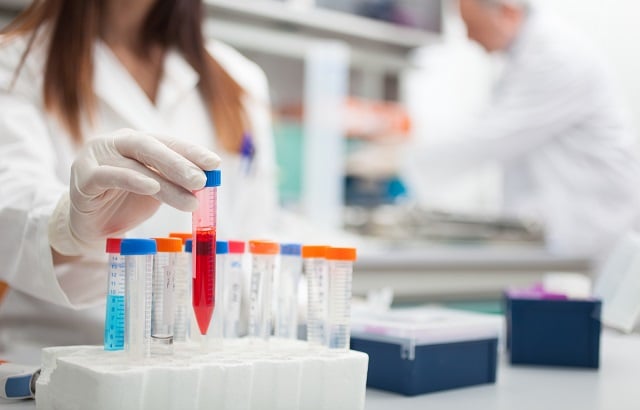

BHF-funded researchers are supporting global efforts to combat Covid-19 and better understand how it affects the heart and circulatory system.

Heart and circulatory diseases are often associated with severe Covid-19, and people with these conditions who are infected with the virus are at greater risk of complications, which can seriously affect patient outcomes.
A number of projects are currently underway involving scientists from our Centre of Research Excellence at the University of Edinburgh.
Assessing damage to the heart
Professor David Newby, Professor Marc Dweck and their team are using scanning techniques to assess the impact of Covid-19 on the heart. Following discharge from hospital, the participating patients have undergone a series of different scans to check the structure and function of the heart and the coronary arteries.
These images show doctors if they have had inflammation of the heart muscle, weakening of the heart muscle due to a stress response, or a heart attack linked to Covid-19. So far, the majority of patients have not had significant damage to their heart muscle. This suggests that any damage linked to the virus seen in other studies while patients are in hospital is likely to be short term.
In another study led by Professor Nicholas Mills, the researchers are aiming to evaluate the direct effects of Covid-19 on the heart by using routine healthcare information and blood test analysis to investigate damage to the heart muscle in patients with confirmed infection. They hope that these studies will provide insight into the indirect consequences of this pandemic to ensure that improved survival rate for heart patients are not undermined.
Viruses, including Covid-19, can cause damage to the heart even with no prior heart disease. Professor Andrew Baker’s study compares heart cells from patients with Covid-19, with and without heart injury. They will examine the heart’s responses, which could help with the management and treatment of patients with Covid-19 and other viral infections.
Our Associate Medical Director, Professor James Leiper, said: “Covid-19 presents an unprecedented challenge for the cardiovascular research community. However, we also have a huge opportunity to harness the expertise of our scientists in Scotland and existing research infrastructure to better understand and tackle this new disease.
“Supporting people living with heart and circulatory diseases is our top priority. A better understanding of how Covid-19 affects the heart and circulatory system – in the short and longer term – may reveal key areas to help fight this devastating disease and ultimately save lives.”
Jim’s story
Jim Cowan from Edinburgh took part in the heart scanning clinical trial after becoming ill with Covid-19 after a trip to Portugal in March, just when lockdown restrictions began to be imposed there. As he travelled back from his holiday, Jim started to feel unwell and after he arrived home his symptoms were worse. Jim called his doctor and he was admitted to hospital with suspected Covid-19 on 23 March. He spent the next six weeks in Edinburgh Royal Infirmary, including ten days in intensive care.
Jim says: “It was all quite a scary experience to realise that I was so unwell, but I kept looking ahead to the point when I could actually walk out of there. All the hospital staff were fantastic.”
Jim was asked if he would participate in the research following his discharge. He explains: “I was happy to take part in the scanning trial – it certainly wasn’t going to do me any harm and I felt it would be better to know if there was any damage to my heart. I also wanted to help build up more knowledge about the virus and how it affects people.
“The scanning process was very straightforward and I was reassured to find out that the results didn’t show any problems with my heart. I’m now feeling in good health and back to full fitness, enjoying my walking and bowling and looking forward to my next holiday.”
Visit our coronavirus hub

